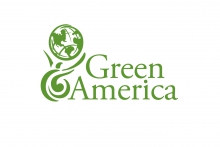
Better Banking
Money from big banks funds fossil fuels, factory farms, weapons of war, and other destructive industries. Better banking is possible with a community development bank or credit union. Your money can help fund a better world.

Money from big banks funds fossil fuels, factory farms, weapons of war, and other destructive industries. Better banking is possible with a community development bank or credit union. Your money can help fund a better world.
When you open a bank account, how do you choose what bank to use? Maybe it’s the one with ATMs close by, or the one your family has always used, or the one that offered you a good deal on a product. But green financing is crucial to an ethical economy, and better banking, aligned with your values, is always possible.
Here’s how it works: When you put your money into a bank account, it doesn’t just sit there. The bank uses the money to make loans. Community development banks and credit unions use the money to finance community needs such as mortgage loans, small businesses, or public works. But the biggest banks use the money to finance major projects -- including disproportionately the fossil fuel industry.
Learn more by clicking on the resources below.

We have had many big breakthroughs recently. Major companies across all industries are changing -- proof of the power of consumer pressure. We are witnessing how our economic power is truly changing the world for good and towards a simpler, more sustainable way of living. We are winning and we are opening doors for more businesses to go green.
Learn more...

Tell these megabanks to finance clean energy for people and planet, not fossil fuels that cause climate chaos.
Tell your House Representative: Protect my freedom to invest responsibly by joining the Sustainable Investment Caucus.
Want your banking to build a better world? Find a bank or credit union near you that benefits people and planet.
Want to build a better world with every swipe? Our Credit Card Guide can help you find a card that benefits people and planet.
By Cathy Becker, Responsible Finance Campaign Director
Earlier this year, Green America released its expanded and upgraded Get A Better Bank map, with 17,000 branches of 3,…
This article was originally published in Nasdaq's Purpose in Action Newsletter on November 19, 2024
By Brittany Greene, Purpose Communications Specialist
In celebration of our partners and the great work they do to…